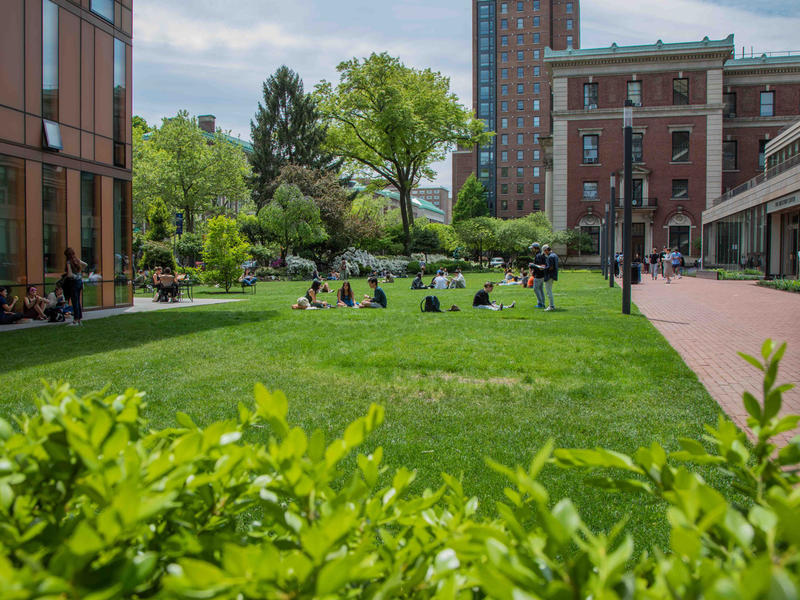 Daniel S. Hamermesh, an economist and Barnard Distinguished Scholar, is the Network Director for the Institute for the Study of Labor (IZA) and the editor-in-chief of IZA World of Labor, an online platform that provides policy analysts, journalists, and academics with research on labor market issues.
Daniel S. Hamermesh, an economist and Barnard Distinguished Scholar, is the Network Director for the Institute for the Study of Labor (IZA) and the editor-in-chief of IZA World of Labor, an online platform that provides policy analysts, journalists, and academics with research on labor market issues.
On April 20 and April 21, under the leadership of Prof. Hamermesh and Prof. Deborah Cobb-Clark of the University of Sydney, Barnard will host the Second Annual IZA Institute Conference on “Gender and Family Economics.” Scholars will present more than 40 scholarly papers, fostering a discussion of gender- and family-related research and policy. The event will also include keynote lectures from two leading economists and an address by Provost and Claire Tow Professor of Economics Linda Bell.
Prof. Hamermesh’s research focuses on time use, labor demand, discrimination, and unusual applications of labor economics (in connection with suicide, sleep, and beauty). His most recent research papers are “Why Are Professors ‘Poorly Paid’?” and “Taking Time Use Seriously: Income, Wages And Price Discrimination.” At Barnard, he teaches the Economics of Life course, which addresses how economics impacts issues such as dating and marriage, labor-force behavior, addiction, and religion.
In this “Break This Down” interview, Prof. Hamermesh discusses the economics of time and gender and the role economics play in everyday life.
Your “Poorly Paid” study shows that academics earn 15 percent less than their non-teaching doctorate counterparts. Why is that the case?
About one-third of the 15 percent wage difference arises because academic life is more flexible than other forms of work—there is more ability to schedule work when the instructor wants it, including on weekends, and more time in summers to go on vacation with family. Most people find that kind of flexibility attractive. The rest of the wage difference, I believe, arises from the freedom that academic life gives instructors and researchers. Professors choose their own research topics and are free to study them as they see fit. More than in any other occupation, professors are really their own bosses.
How do economics affect a person’s use of time?
People respond to incentives, and among the biggest incentives are our wages—the “price” at which we can sell our time—and the other income to which our household has access. Being able to earn more per hour leads us to work more; but doing so leaves less time over which to spread the greater earnings, making us rushed for time. Even those who do no paid work have to shoehorn their household’s income into a fixed number of hours per day. So it’s not surprising that both workers and non-workers who have more income do things that take more dollars per hour than do other people. Higher-income people sleep less and watch less TV but go out to restaurants, theater, concerts, and sporting events more than others.
Which issues will be discussed at the Barnard-IZA Conference?
Some of the most interesting discussions involve looking at how the presence of women among top earners and in highly visible occupations has changed over time and how it differs across countries. The importance of mentoring women, role models, and norms in behavior are analyzed in some of the studies. Policies such as school-starting times, family leave, and the U.S. Earned Income Tax Credit are among the many that will be analyzed at the Barnard conference.
In your “Economics of Life” course, how do students use economics to understand daily life?
The purpose of the class is to get students to think about their own past, current, and future life courses, and to realize that a lot of what they do can be explained by the economic incentives they face. For example, in dating markets people’s choices are affected, whether they know it or not, by the incentives provided by the size and make-up of the group of prospective dates. Finding a prom date leads to unusual behavior that is like the behavior that economists have analyzed in job markets. In short, nearly every aspect of our personal behavior has useful analogs in more familiar markets, and the study of those analogs helps students realize how useful economics is in their daily lives.
Why is it important for students in your course to personally collect and then collaborate on the data?
Collecting data—which comes after the students have cooked up their ideas and designed their hypotheses—is a good way for them to think about the scientific method. Because I expect a serious piece of work that might even be publishable, having students pair up to do their projects mitigates the burden on each student. It also has the advantage of letting students bounce their thoughts off their project partner throughout the project.
Among the more interesting projects created this past term was one entitled “Swipe-Matching and the Cost of Sex: Relationships in the Age of Tinder,” and another called “Social Media and the Contingent Value of New York City Attractions.”
-
To learn more about the Barnard-IZA Institute Conference: economics.barnard.edu.
-
For more interviews from this series, visit Break This Down.
-
To learn more on gender and wages, read interviews with Provost Linda Bell and Athena Center Distinguished Fellow Carol Evans.



